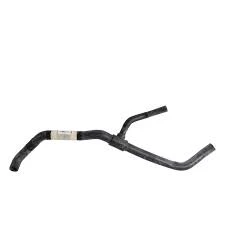Lower Power Steering Hose - High-Quality Replacement Solutions
Aug . 31, 2024 10:44 Back to list
Lower Power Steering Hose - High-Quality Replacement Solutions
Understanding Lower Power Steering Hose Importance and Maintenance
The power steering system in vehicles plays a crucial role in ensuring smooth and easy steering, especially at lower speeds. One of the key components of this system is the lower power steering hose. This hose is responsible for transporting hydraulic fluid from the power steering pump to the steering gear, enabling drivers to steer their vehicles with minimal effort. Understanding the function and maintenance of the lower power steering hose is essential for vehicle owners who wish to ensure optimal steering performance and safety.
Function of the Lower Power Steering Hose
The lower power steering hose serves as a conduit for hydraulic fluid, which amplifies the force applied by the driver when turning the steering wheel. Typically made of rubber or reinforced synthetic materials, this hose is designed to withstand high pressure and temperature variations. As fluid flows through the hose, it allows the steering mechanism to respond quickly and efficiently to the driver's inputs. Any leak or blockage in the hose can result in diminished steering performance, making it vital to ensure this component is in good condition.
Signs of a Failing Lower Power Steering Hose
lower power steering hose

Recognizing the warning signs of a deteriorating lower power steering hose is crucial for maintaining your vehicle’s steering system. Common indicators of a failing hose include visible leaks of power steering fluid, which may appear as a reddish or burnt oil-like substance beneath the vehicle. Additionally, drivers may experience a whining or groaning noise when turning the steering wheel, which can signify low fluid levels due to a leak. If steering becomes stiffer or unresponsive, it’s essential to have the hose inspected immediately, as this can compromise safety while driving.
Maintenance Tips
To keep your lower power steering hose in optimal condition, regular maintenance is key. Begin by routinely checking the power steering fluid level and topping it off as needed. Additionally, inspect the hose for any signs of wear, such as cracks, bulges, or abrasions. It’s also wise to have your power steering system flushed and the fluid replaced during routine vehicle service to prevent build-up of contaminants that could affect performance.
Conclusion
The lower power steering hose is a vital part of your vehicle’s power steering system. By understanding its importance and recognizing the signs of potential issues, drivers can take proactive steps to ensure their steering system operates smoothly and efficiently. Regular maintenance and timely repairs can extend the life of the hose, promoting safer driving experiences and maintaining vehicle performance. Always consult a professional mechanic if you suspect any problems with your power steering system to ensure your safety on the road.
